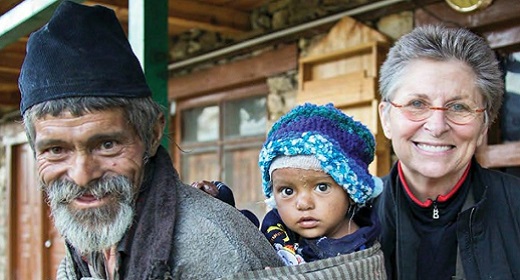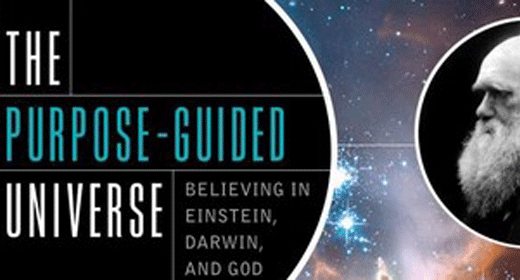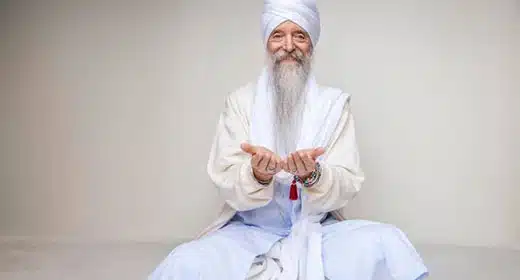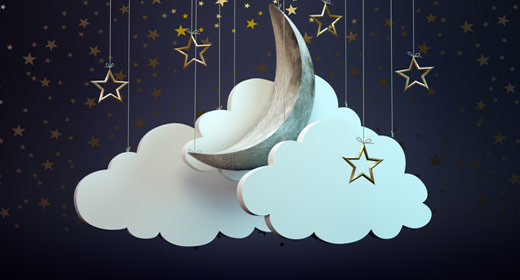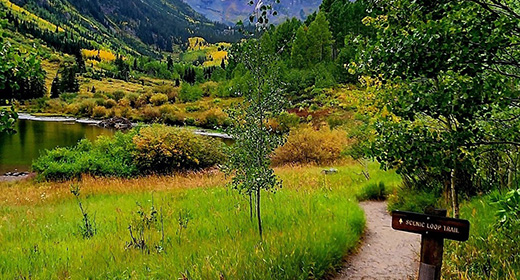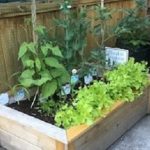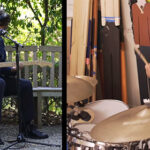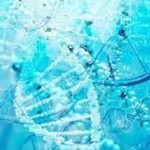Donna Quesada: I think that is what is often lost when we approach healing is the spiritual aspect if you will.
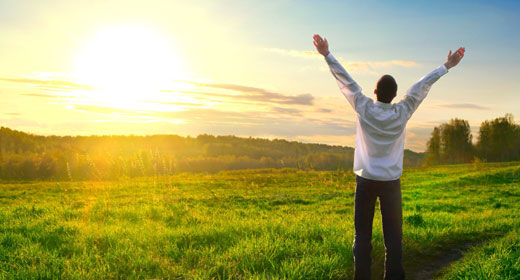
You’ve spoken of how empowering it is when you look within and meditation enables that. For most people that is something you do in the self help isle. That is not something you get from a doctor’s visit. And you are saying it is all related. It’s a process of connecting the dots, wouldn’t you say?
Dr. Dean Ornish: In most cultures, doctors are healers. They are one and the same. And the spiritual aspects are a big part. Look, I’m a scientist first and foremost. We publish our research in the Journal of the American Medical Association, The Lancet, The New England Journal of Medicine… on and on and on… because I think that science has great value in helping people sort out what’s true and what isn’t and what works and what doesn’t… for whom, and under what circumstances… and all of that. But science, as powerful as it is, is limited. When you start talking about things, like, meaning and purpose and joy and pleasure… one of the reasons I think all spiritual traditions have dietary guidelines… and they are often different from each other… Is God confused? One religion, you can eat this, but not that, or, certain days of the week. Whatever the intrinsic value of certain diets is… just the act of not eating certain foods that you otherwise could eat, imbues them with meaning.
You know, when I got suicidally depressed, I could take all the meaning out of something. Who cares? So what? Nothing matters. Big deal. Why bother? What I learned later, is that you can imbue your choices with meaning. In fact, Victor Frankel wrote a book, 50 years ago, called Man’s Search for Meaning, which is about concentration camp survivors. What he found was it wasn’t the strongest or the healthiest that survived. It was the ones that had the strongest sense of meaning and purpose. I’ve got to survive, so I can do…whatever… be reunited with my loved ones, or, watch my kids grow up… write a book and bare witness…
So, when I meet with patients for the first time, I often ask them “Why do you want to live longer? I say, “why do you want to change your lifestyle?” “Why do you want to live longer?” Wow, no one has ever asked me that before. Because… especially here, in Silicon Valley, where I live, there is an implicit assumption that everybody wants to live forever. But telling someone that is lonely and depressed that they are going to live longer is not that motivating! If you can get people to get in touch with why they want to live longer… same thing! “Watch my kids grow up… dance at their wedding… make love with my spouse… write a new book… discover something new…
Finding meaning and purpose is part of what makes this sustainable, as well. And so, choosing not to eat certain foods… is that deprivation? Well, it can be. But, it can also be that I am imbuing my life with meaning by not eating certain foods. Especially, when you realize that you are helping the planet. Helping feed the hungry and it’s helping me. Being in a committed monogamous relationship is also a choice people make. That could be a repressive moral majority kind of thing… the ball and chain. Or, it can be incredibly liberating. Because you can only be intimate with someone to the point that you can open yourself up and be vulnerable. And you can only do that to the extreme, if you feel safe. You have two people that are totally committed to each other, and monogamy, and they say they are doing it so we can open our hearts and be more intimate… so we can love each other in a deeper way.
What we find, is that the intimacy just gets greater and greater. The more intimate it is, the more erotic it is. So, here again, what you gain is so much more than you give up, and it makes these choices sustainable. This is really what brings the most joy and meaning and pleasure and fun in our lives.
DONNA: Yes. And for those that are still skeptical… What would you tell them if they said, “Why should I meditate? What is this New Age stuff and how is that going to help me with my heart attack?”
DEAN: Well, that is why we do research. So we can show how powerful these approaches can be. It gives many people permission to do things they might not have done. Wow, this is so weird but it’s proven, so I might as well give it a try. And when you try it… because these biological mechanisms we’ve been talking about are so dynamic… most people feel so much better, so quickly. For them, it reframes the reasons for making these changes, from fear of dying, to joy of living, and pleasure, and meaning, and fun. And, you can experience it yourself. We talked about it before. When I do this, I feel good, when I do that, I don’t feel so good. And so, let me do more of this and less of that. And because it comes out of your own experience, you don’t have to say, “this person says this or that person says that… This book says this or that.” You get it. You understand it. You feel it. So, that makes it work. And sustainable.
DONNA: And what is meditation to you, Dr. Ornish?
DEAN: Meditation is the art of quieting down your mind, so you can experience more of an inner sense of peace and joy and well-being. And you can do that in a number of different ways. One of the easiest is to focus on a word, a sound, or a phrase. It can be secular. It can be religious. Certain sounds have been found to be very soothing. Om is the classic, or Shalom, or Amen. These are often words that are translated to mean peace. They usually begin with an O or an Ah, they end with an M or an N. The word one in a more secular way.
So, to meditate, just close your eyes, say One, or Om, or whatever it is you want to focus on. Focus on the humming sound, ‘till you are out of breath. Take a breath. Take a breath. Do it again. Easy to learn. Hard to master. No one really masters meditation. What happens is that your mind begins to wander. You start to think… I’ve got to do this. I’ve got to do that. And as soon as you become aware that you are thinking about something else, bring it back to the sound. Over and over again. Your mind begins to quiet down. We begin to experience the things we have been talking about. It’s very powerful. Also, you get much better, even in the secular world. Professional athletes… they meditate because it gives them a competitive advantage.
Whatever you are doing, when you can focus energy, you have more power. But ultimately, the real transformative part is when it takes you to that place. Because it quiets our mind, you can listen to your inner Swami, your inner wisdom, your inner teacher… whatever name you give to that. It’s that little voice that speaks very clearly and very quietly, that says, “Hey Dean, you aren’t doing something properly.” All of the studies that I have ever done have come from that voice. And we can kind of reverse engineer and see if we can prove that or not. So, at the end of every meditation, I ask that voice… I say “hello” to it. And I say, “what am I not paying attention to, that I need to be paying attention to?” And I listen. And it’s amazing how useful the information can be that comes from that. I’ve learned to trust that voice and then once you do that every day… even a few minutes every day… and even in the busiest parts of your day, you can kind of close your eyes and hear that voice. So, it can be an incredible guiding voice, in a way, that is incredibly productive and creative.
DONNA: And it’s not religion specific…
DEAN: That’s right. You can do it in a religious way. You can do it in a secular way. What’s important is to do it in a way that is comfortable for you.
DONNA: Let me switch gears now, with the little bit of time we have left. I think we are all under this spell of what I sometimes call “The Protein Myth.” And I think that makes it hard for people to make a switch, or a transition in their approach to eating. Can you speak to this Protein Myth? This idea that we need so much protein… And it keeps us in this meat-based way of eating.
DEAN: Yeah, a lot of people think you are not going to get protein on a plant-based diet. The fact is that most Americans get too much protein and too much protein is as bad as not getting enough. James Cameron, the legendary film-maker who did Titanic and Terminator and Avatar and all those great films, went on a plant-based diet nine years ago, originally for environmental reasons. And then he actually had so much energy that he is making Avatar 2, 3 and 4 at the same time. He’s 63 years old and has unbelievable energy. He made this film called Game Changers, to address this myth that you are a wimp if you don’t get enough protein and you eat a plant-based diet. All these olympians who became medalists and boxers who became heavy weight champions… martial artists, national champions, NFL superstars and bodybuilders.
By going on a plant-based diet to try to counter this myth… and there is this great scene in the movie where he has these three athletes in their mid-twenties… and he gives them a single meat-based meal. And it’s organic chicken and grass-fed beef. And they have a urologist measure the frequency and hardness of the erections that they get at night. And then they do the same thing a day later with a single plant-based meal. And after the plant-based meal, they found that all three of these guys had three to five hundred more frequent erections and 10% to 15% harder erections. And what it shows is how dynamic these changes are. It’s not that you do this to prevent something bad from happening down the road. That is really not sustainable. I mean, for a month after someone has a heart-attack they will do pretty much anything, but they don’t stick with it. But if you say, what I gain is so much more than what I give up, then those are choices worth making. You can get plenty of protein.
DONNA: Well, that should appeal to a number of men!
DEAN: And women! There are a lot of people out there on drugs, like Viagra. In fact, if you have problems with Erectile Disfunction, you have a much higher risk of heart disease. It’s a whole system. It’s blood throughout your body… your face, your heart, your skin, your sexual organs… get better when you eat this way and live this way. Likewise, stress constricts your blood vessels. Nicotine constricts your blood vessels. It’s kind of the anti-Viagra. That’s why in the book, I try to show why these changes are so powerful. The biggest obstacle that I find, that most people have to making these changes, is that it is hard for them to believe how powerful they can be. They say, “It’s got to be a new drug or a new laser or something really high tech. How powerful can these simple changes be?” Well, pretty darn powerful. The more we study, and the more underlying mechanisms we look at, the more evidence of how these same lifestyle changes can prevent or even reverse the most common chronic cases. And how quickly we can measure that.
DONNA: And you have an online support community, where you help people make these changes. Is that right?
DEAN: Well, if you go to Ornish.com, we have a community, but we don’t have an online community yet. But the people that have gone through our programs, Medi-Care and others, after they finish their nine weeks, they continue their support groups, using Zoom or Skype or other technologies, like that. They’ve already bonded with each other. So, it’s actually easier. They agree to Skype or Zoom in at a certain time, from where ever they are. We have people that have been doing that for decades. The project is nine weeks long. A year later, up to 90% of the people are still following it. It’s so meaningful to people, and the results are so clear to them.
DONNA: And in these last few moments, Dr Ornish, what is your vision of humanity? Do you have hope for these kinds of changes on a planetary level… and for a collective way of living in a holistic way, that is healthy?
DEAN: Well, it’s easy for me to get despairing. Despair is something I have experienced more than most people. And I’ve learned not to allow myself to go to those places. I can read the headlines and get very despairing, like a lot of people. But part of the power of darkness or evil, if you want to put it that way, is to obscure that we even have a choice. And we have a choice at every moment. Do you want to go to the light or to the dark? I think that is why the Star Wars films are so successful. It’s the essence of what kind of choice do you want to make here? And one of the reasons I like the Star Wars films is, sometimes people make dark choices in the name of something good. Preventing their baby from dying… Saving their mother… So, we have to be very careful about those things… that we don’t perpetuate the darkness in the name of doing that.
I take solace that the light always drives out the darkness. But sometimes you have to have a very bright light these days… because the darkness is so great. But I am cautiously optimistic. In medicine, at least, there is a convergence of forces that really make this the right idea at the right time. The limitations of drugs and surgery is becoming clearer at the same time that lifestyle intervention is becoming clearer. The costs are not sustainable and we want to make healthcare available to everyone. We can’t do that if we do more of the same. We have to do something radically different. So, this is a drama that has gone throughout time. The dark and the light. I think more and more people are waking up and realizing that it has to come from us. And it will come from us, and I’m encouraged that on one hand, the darkness is getting strong, but the light is getting stronger, too.
So, I think that we live in very interesting times. And that’s why I’m hopeful and I appreciate the opportunity to have this conversation with you. Part of my Dharma, my destiny… What gets me out of bed every day, is to feel like… if we can raise awareness and empower people, then we can help them use the experience of suffering on a personal level, or a social level, or a planetary level… as a doorway for transforming our lives and for growing in wisdom. And discovering our own inner health and peace and well-being in ways that can help us love ourselves and love each other. As insipid as that may sound, I think it’s the most powerful force in the universe.
DONNA: Well, that is a powerful note to end on. So, with that, I will thank you for spending this time with us.
DEAN: Thank you! I am really grateful.
DONNA: Thank you, Dr. Ornish!
Read and Watch Part I Here: Awaken Interviews Dr. Dean Ornish Pt 1 –Eat Well, Move More, Stress Less, Love More
Read and Watch Part II Here: Awaken Interviews Dr. Dean Ornish Pt 2 – What Is Good For Me Is Good For The Planet
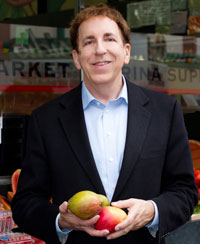 Dr. Dean Ornish, M.D.., is the founder and president of the nonprofit Preventive Medicine Research Institute, clinical professor of medicine at the University of California, San Francisco, and the author of six books, all national bestsellers. He has received numerous honors, including the Outstanding Young Alumnus Award from the University of Texas, Austin, and the National Public Health Hero Award from the University of California, Berkeley. Dr. Ornish was recognized as a “TIME 100 Innovator;” by Life magazine as “one of the 50 most influential members of his generation;” by People magazine as “one of the most interesting people of the year;” and by Forbes magazine as “one of the world’s seven most powerful teachers.”
Dr. Dean Ornish, M.D.., is the founder and president of the nonprofit Preventive Medicine Research Institute, clinical professor of medicine at the University of California, San Francisco, and the author of six books, all national bestsellers. He has received numerous honors, including the Outstanding Young Alumnus Award from the University of Texas, Austin, and the National Public Health Hero Award from the University of California, Berkeley. Dr. Ornish was recognized as a “TIME 100 Innovator;” by Life magazine as “one of the 50 most influential members of his generation;” by People magazine as “one of the most interesting people of the year;” and by Forbes magazine as “one of the world’s seven most powerful teachers.”




